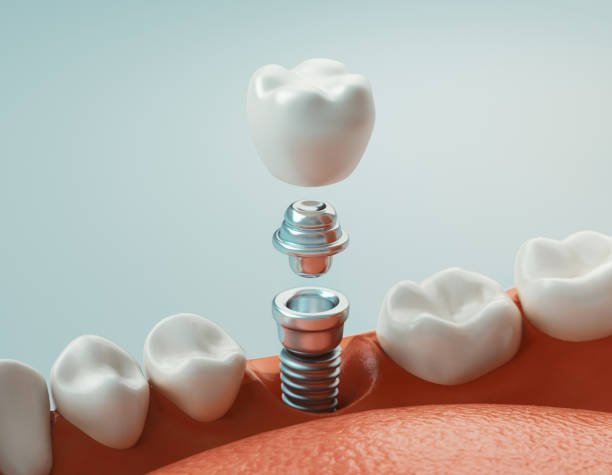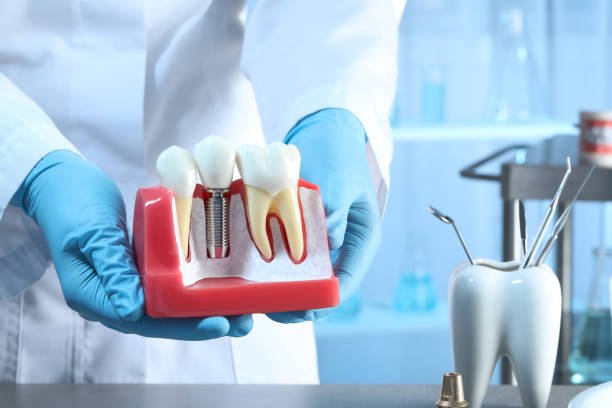In modern dental care, the question is whether your mouth can reject an implant. It garners much interest. This concern is understandable, given that Teeth implants represent a significant investment in your oral health. They’re praised for their durability. They also mimic natural teeth perfectly. Yet, the possibility of rejection looms in the minds of many potential recipients. In this article, we’ll explore this topic. Our aim is to clear up confusion and give you the info you need. Then, you can proceed with confidence.
Understanding Dental Implants
First off, let’s get to grips with what dental implants actually are. These tiny marvels of dental tech have three parts. First, the implant itself is a titanium screw inserted into your jawbone. Second, there is the abutment, a connector. Last is the crown, the part that looks like a tooth. Titanium is strong and biocompatible. It is the top choice for most implants, making them safe for most patients.

The Myth of Rejection
Now, onto the crux of the matter: can your mouth really “reject” an implant? Simply put, dental implants usually work. But, there are cases where they don’t join with the jawbone well. However, it’s crucial to understand that this isn’t rejection in the traditional sense. Organ transplants can be rejected by the body’s immune system. In contrast, dental implants usually fail because of osseointegration. This fancy term means the fusion of the implant and bone.
Spotting the Signs of Trouble
Recognising the signs of implant failure early on can make all the difference. Here are a few red flags to watch out for:
- Wobbliness: If your implant feels as if it’s not quite part of you, like it’s got a bit of a wobble, that’s a sign that it hasn’t integrated properly.
- Discomfort or Pain: Discomfort or pain is a sign something is wrong. It’s around the implant site and happens when pressure is applied.
- Swelling or Inflammation: Swelling or inflammation is normal after surgery. But, ongoing inflammation around the implant could be a cause for concern.
Steering Clear of Trouble
Fortunately, there are steps you can take to minimise the risk of implant failure:
- Aftercare is Key: Proper oral hygiene is non-negotiable. Brushing, flossing, and rinsing with an antibacterial mouthwash will keep your implant healthy. It will also keep the nearby tissues healthy.
- Quit the Ciggies: It harms your oral health. It slows healing and raises the risk of implant failure. If you smoke, it’s wise to quit.
- Tackle Teeth Grinding: If you’re prone to grinding your teeth, talk to your dentist about a mouth guard. Grinding can place excessive force on implants, potentially leading to problems.
- Keep Gum Disease at Bay: Healthy gums are essential for a successful implant. Managing gum disease is crucial to avoid complications.
The Path Forward After Failure
Should an implant not take as hoped, it’s not the end of the road. Your dentist can remove the implant. Then, they will let the area heal. After that, they can consider a second attempt. In many cases, a second implant attempt can succeed. This is especially true if the initial issues have been fixed.
Also read: Can 1 Implant Replace 2 Teeth?
Conclusion
The idea of your mouth rejecting an implant might sound scary. But, actual failures are rare. This is thanks to advances in dental tech and techniques. By understanding the process and recognizing signs of problems, you can avoid them. This greatly boosts your chance of a successful, lifelong implant.
The key to navigating dental implants is to stay informed. Keep open lines of communication with your dental professional. They’re there to guide you through the process. They’ll help from the first consultation to after the implant. They make sure your journey to a brighter smile is as smooth as possible.
In essence, the question “Can your mouth reject an implant?” is valid, it’s also one that carries a reassuring answer. With proper care, the chance of facing this issue is low. This will leave you free to enjoy the many benefits of dental implants.

Take Your First Step Towards a Confident Smile with GK Dental Implants and Cosmetic Clinic
Feeling unsure about dental implants? Don’t let worries hold you back from achieving the smile you’ve always wanted. We are at GK Dental Implants and Cosmetic Clinic. We are dedicated to giving you a clear and comfortable experience. We do this with dental implants. We’re also committed to making it successful. Our experts use the latest tech and methods. They ensure the best outcomes for our patients. Do you wonder about the process? Are you worried about implant rejection? Or are you ready to take the next step? We’re here to guide you at every step.
Book your consultation today. Discover how we can help you regain not just your smile, but your confidence too. You can get a brighter, healthier smile with GK Dental Implants and Cosmetic Clinic. Let’s embark on this journey together.
Frequently Asked Questions
What materials are used for dental implants at GK Dental?
At GK Dental, we use medical-grade titanium and zirconium for implants. They are known for their durability and compatibility with the human body. This ensures a safe and long-lasting fix for missing teeth.
What is the success rate of dental implants at GK Dental?
GK Dental boasts a high success rate for dental implants. It is close to the industry average of over 95%. Our skilled professionals ensure optimal outcomes through precise planning and execution.
How do I care for my dental implants?
Caring for dental implants involves regular brushing, flossing, and rinsing. You should use an antibacterial mouthwash. This is like caring for natural teeth. GK Dental recommends regular check-ups and cleanings to maintain implant health.
What if my dental implant feels loose?
If your implant feels loose, contact GK Dental immediately. This could indicate an issue with osseointegration or the implant itself. Our team will assess and address the problem to ensure the longevity of your implant.
Also read: How Much Does a Single Dental Implant Cost in the UK?






